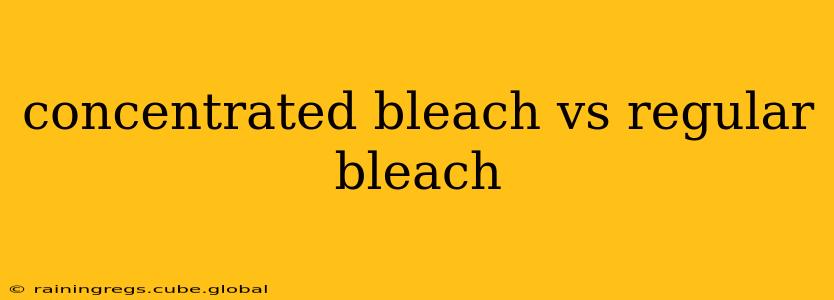Bleach is a powerful cleaning agent used in homes and businesses worldwide. However, not all bleach is created equal. Understanding the difference between concentrated bleach and regular bleach is crucial for safe and effective cleaning. This article will delve into the key distinctions, highlighting the benefits and drawbacks of each type, and helping you choose the best option for your needs.
What is Concentrated Bleach?
Concentrated bleach, also known as high-concentration bleach or industrial bleach, contains a significantly higher percentage of sodium hypochlorite (NaOCl) than regular household bleach. While regular bleach typically contains around 5-6% NaOCl, concentrated bleach can range from 8% to 15% or even higher. This higher concentration makes it a more potent disinfectant and bleaching agent, but it also requires more careful handling.
What is Regular Bleach?
Regular bleach, commonly found in supermarkets and grocery stores, is a diluted solution of sodium hypochlorite. Its lower concentration makes it suitable for everyday household cleaning tasks, such as laundry, disinfecting surfaces, and whitening clothes. However, its lower potency means it might be less effective against stubborn stains or heavy-duty disinfection needs.
What are the Advantages of Using Concentrated Bleach?
- Greater Cleaning Power: The higher concentration of sodium hypochlorite means concentrated bleach effectively tackles tougher stains and disinfects more thoroughly. This is particularly useful in industrial settings or for cleaning heavily soiled items.
- Cost-Effective (in some cases): While the initial purchase price might be higher, the higher concentration means you need less concentrated bleach to achieve the same cleaning result, potentially making it more cost-effective in the long run.
- Superior Disinfection: Concentrated bleach provides superior disinfection capabilities, making it effective against a broader range of bacteria, viruses, and fungi.
What are the Disadvantages of Using Concentrated Bleach?
- Increased Risk of Injury: The higher concentration of sodium hypochlorite makes concentrated bleach more corrosive and irritating to skin and eyes. Proper safety precautions, including gloves, eye protection, and adequate ventilation, are essential.
- Potential for Damage: Concentrated bleach can damage certain materials, such as fabrics, metals, and some plastics, more readily than regular bleach.
- More Difficult to Handle: Diluting concentrated bleach accurately requires care and precision to avoid accidental over-concentration.
What are the Advantages of Using Regular Bleach?
- Safer Handling: The lower concentration of sodium hypochlorite in regular bleach makes it safer to handle, reducing the risk of accidental injuries.
- Versatile Use: Regular bleach is suitable for various household cleaning and laundry tasks.
- Readily Available: Regular bleach is widely available at most grocery stores and supermarkets.
What are the Disadvantages of Using Regular Bleach?
- Less Powerful: Regular bleach might not be effective against stubborn stains or heavy-duty disinfection needs.
- Higher Consumption: You may need to use more regular bleach to achieve the same cleaning result compared to concentrated bleach.
How to Dilute Concentrated Bleach Safely?
Always follow the manufacturer's instructions for diluting concentrated bleach. Generally, this involves mixing a specific amount of concentrated bleach with water in a well-ventilated area. Never mix bleach with other cleaning products, particularly ammonia or acids, as this can create dangerous and toxic fumes.
What is the Best Bleach for Laundry?
For general laundry purposes, regular bleach is usually sufficient. Concentrated bleach may be too harsh and potentially damage certain fabrics.
Which Bleach is Best for Disinfecting?
For effective disinfection, particularly in situations requiring a high level of germ eradication, concentrated bleach offers a more powerful solution but necessitates careful handling and dilution. Regular bleach can still disinfect but may require longer contact time.
Is Concentrated Bleach Better Than Regular Bleach?
Whether concentrated or regular bleach is "better" depends on your specific needs and the task at hand. Concentrated bleach offers superior cleaning power and disinfection but requires more cautious handling. Regular bleach is safer and more convenient for everyday household use. Choosing the right type of bleach involves weighing the benefits and risks associated with each option.
